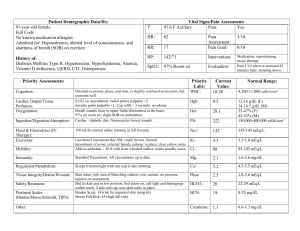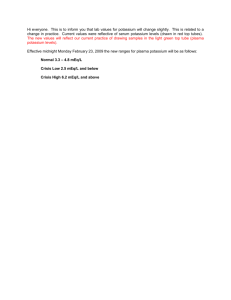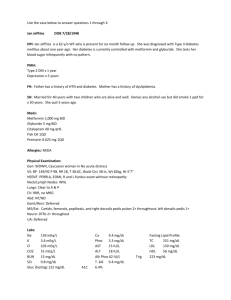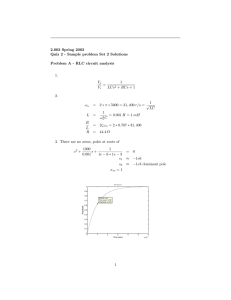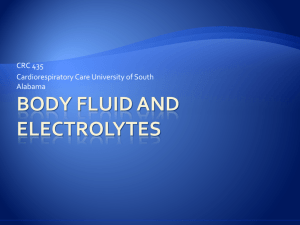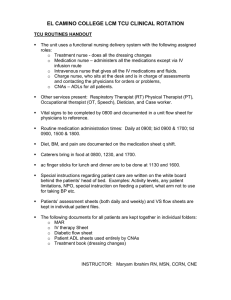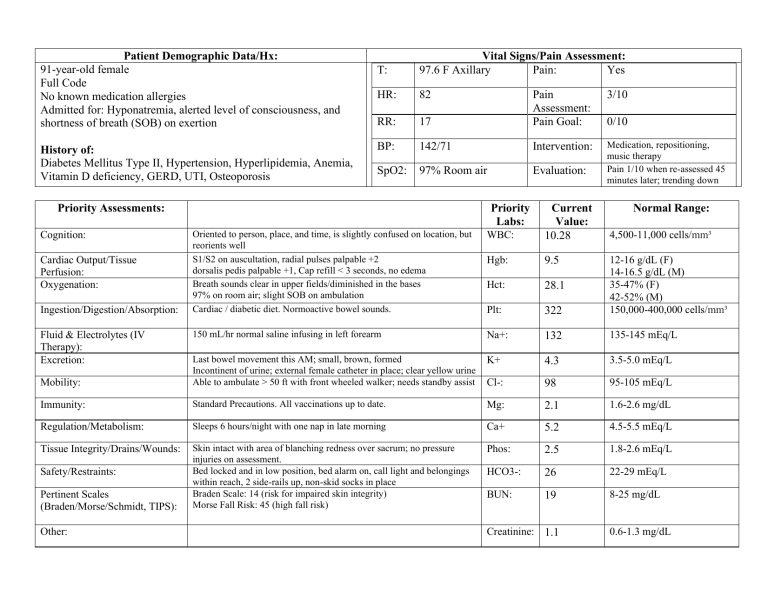
Patient Demographic Data/Hx: 91-year-old female Full Code No known medication allergies Admitted for: Hyponatremia, alerted level of consciousness, and shortness of breath (SOB) on exertion History of: Diabetes Mellitus Type II, Hypertension, Hyperlipidemia, Anemia, Vitamin D deficiency, GERD, UTI, Osteoporosis T: Vital Signs/Pain Assessment: 97.6 F Axillary Pain: Yes HR: 82 RR: 3/10 17 Pain Assessment: Pain Goal: BP: 142/71 Intervention: SpO2: 97% Room air Evaluation: Medication, repositioning, music therapy Pain 1/10 when re-assessed 45 minutes later; trending down Priority Assessments: Oriented to person, place, and time, is slightly confused on location, but reorients well S1/S2 on auscultation, radial pulses palpable +2 dorsalis pedis palpable +1, Cap refill < 3 seconds, no edema Breath sounds clear in upper fields/diminished in the bases 97% on room air; slight SOB on ambulation Cardiac / diabetic diet. Normoactive bowel sounds. WBC: Current Value: 10.28 Hgb: 9.5 Hct: 28.1 Plt: 322 12-16 g/dL (F) 14-16.5 g/dL (M) 35-47% (F) 42-52% (M) 150,000-400,000 cells/mm³ 150 mL/hr normal saline infusing in left forearm Na+: 132 135-145 mEq/L K+ 4.3 3.5-5.0 mEq/L Mobility: Last bowel movement this AM; small, brown, formed Incontinent of urine; external female catheter in place; clear yellow urine Able to ambulate > 50 ft with front wheeled walker; needs standby assist Cl-: 98 95-105 mEq/L Immunity: Standard Precautions. All vaccinations up to date. Mg: 2.1 1.6-2.6 mg/dL Regulation/Metabolism: Sleeps 6 hours/night with one nap in late morning Ca+ 5.2 4.5-5.5 mEq/L Tissue Integrity/Drains/Wounds: Skin intact with area of blanching redness over sacrum; no pressure injuries on assessment. Bed locked and in low position, bed alarm on, call light and belongings within reach, 2 side-rails up, non-skid socks in place Braden Scale: 14 (risk for impaired skin integrity) Morse Fall Risk: 45 (high fall risk) Phos: 2.5 1.8-2.6 mEq/L HCO3-: 26 22-29 mEq/L BUN: 19 8-25 mg/dL Cognition: Cardiac Output/Tissue Perfusion: Oxygenation: Ingestion/Digestion/Absorption: Fluid & Electrolytes (IV Therapy): Excretion: Safety/Restraints: Pertinent Scales (Braden/Morse/Schmidt, TIPS): Other: Priority Labs: 0/10 Creatinine: 1.1 Normal Range: 4,500-11,000 cells/mm³ 0.6-1.3 mg/dL Priority Medications: Time Due: Indication: Potential Side Effect/Adverse Reaction: Folic Acid 150 mcg PO once daily 0900 Anemia Multivitamin 1 tab PO once daily 0900 Supplement Constipation, upset stomach, diarrhea Vitamin D 2,000 IU PO once daily 0900 Vitamin D deficiency; osteoporosis Nausea, vomiting, constipation, weakness Zinc Sulfate 8 mg PO once daily 0900 Dietary supplement, immunity, skin integrity Indigestion, diarrhea, headache, nausea Pepcid 20 mg PO once daily 0900 GERD Anxiety, bleeding gums, lack of appetite Lisinopril 10 mg PO once daily 0900 Hypertension Metformin 500 mg PO once daily with meals Atorvastatin 20 mg PO once daily 1800 Diabetes Mellitus 1800 Hyperlipidemia Normal Saline 150 mL/hr Intravenous Continuous Hyponatremia Dry cough, cloudy urine, blurred vision, sweating, weakness Abdominal discomfort, decreased appetite, diarrhea, muscle pain, sleepiness Cough, dizziness, muscle cramps, chest tightness Injection site swelling, redness, fever Priority Diagnostic Exams/Results: Weakness, skin rash, fever, chest tightness Perioperative Care (if applicable): DEXA scan- T-Score: -2.7 consistent with osteoporosis Chest x-ray- right lower lobe patchy infiltrates n/a Priority Health Education/Health Promotion: Diet plan- reduce carbohydrates, limit trans and saturated fats Psychosocial/Cultural/Spiritual: Requested Chaplain for prayers Increase daily activity- include small 2-pound weights for strength training and to build bone and muscle mass Discussed that she has “been feeling down” since husband of 65 years passed away last year. Social support system is limited as she had no children and her husband, siblings, many of her friends have passed away. Quality Improvement: Only brought necessary supplies into room to avoid medical waste. Collaborated with primary RN to adhere to Quality Improvement Fall Prevention program. Change of IV tubing and IV site dressing change per facility policy. Patient Centered Care: Ensure physical, emotional, and spiritual safety by using therapeutic communication and touch. Called Chaplain to pray with patient. Timed medication administration to when patient requested; notified primary RN and MD of need to change due times of medication. Nursing Diagnosis: Nursing Diagnosis: Risk for falls related to altered level of consciousness Goal: Patient will remain free from fall during shift. Interventions: Bed locked and in low position, call light and belongings within reach, nonskid socks in place, and hourly rounding. Evaluation: Patient remained free from injury during shift. Goal met. Concept: Electrolyte imbalance (hyponatremia) related to fluid loss as evidenced by serum sodium <135 mEq/L and fatigue Goal: Fluid & Electrolyte Imbalance Patient Na+ level will be greater than 135 mEq/L on next lab draw Hyponatremia Maintain strict I & O monitoring Administer IV fluids as ordered, fluid restriction as ordered. Daily weight. Exemplar: Interrelated Concept: Cognition Interrelated Exemplar: Fall Precautions Fall precautions Evidence-Based Practice: 5 moments of hand hygiene with each patient interaction. Used external catheter rather than indwelling to prevent catheterassociated urinary tract infection. Braden scale to assess pressure injury risk. Morse Fall/Schmidt/Hester Davis/ TIPS to assess fall risk. Safety: Medication rights, allergies, and expiration dates checked before administration, checked pertinent lab values, dosages, and routes. Ensured that bed was locked and in low position, with call light and belongings within reach. Bed was up to high Fowlers for feeding. Neuro checks q4 hours as ordered. Aspiration precautions. Interventions: Evaluation: On next lab draw patient’s Na+ remained at 132. Strict I & Os were monitored; fluid balance of + 950 mL/this shift. Goal unmet. Informatics: Teamwork & Collaboration: Worked with nursing aid when bathing and repositioning patient. Worked with physical therapy to increase mobility. Educate nursing assistant/unlicensed personnel about fluid restriction and daily weight orders. Collaborated with primary RN and MD to change medication schedule. Collaborated with Chaplain to ensure spiritual needs were met. Documented assessment of vital signs, I & O’s, and ADLs into the electronic health record per facility policy. Used glucometer for blood sugar checks and vitals machine to assess morning and afternoon vital signs. Bladder scanner to check for urine retention.
